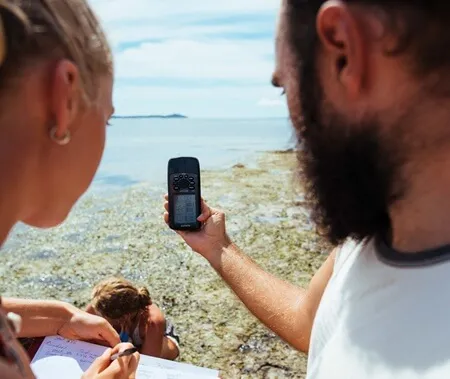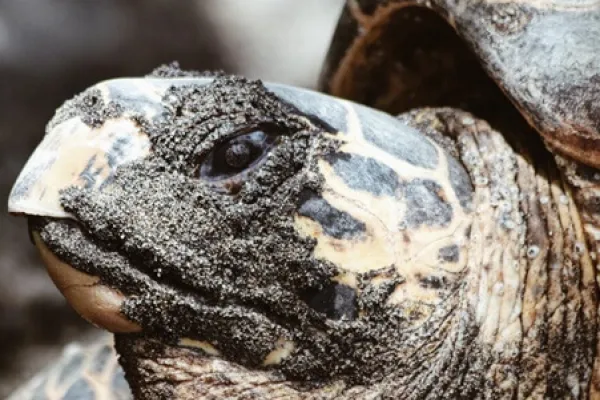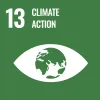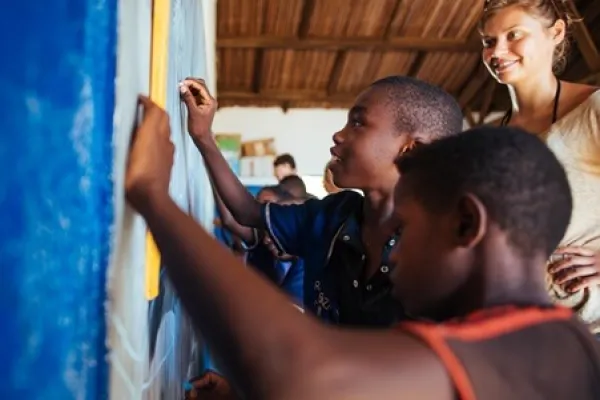Overview
If travelling to Madagascar has always been your dream, then Volunteering Solutions is here to fulfill it, in the most unique manner. This magical island country is home to some of the world's most spectacular and least explored dive sites and now, you can receive comprehensive practical scuba-diving lessons and theory training to prepare yourself to undertake research-based activities at sea.
The Marine Conservation Program has been designed in collaboration with oceanographic organisations to gather vital raw scientific data through a number of initiatives including Reef Surveys, Beach Cleanups, Artificial Reef Construction and Cleaning, Community Engagement, collecting and reporting debris data and monitoring coral health by collecting data on coral bleaching using the Coral Health Chart.
This region has immense multi-colored corals and luxuriant sea grass beds which provide rich feeding grounds for an extraordinary array of colorful reef fish, rays, sea urchins, anemones, octopus and even sea turtles, while barracuda, sharks, dolphins, migrating whales and shoals of pelagics cruise the deep blue waters offshore. You'll get to indulge yourself in learning more about the ecosystem and know how the fishing communities utilize the resources to their best capacity.
Volunteers are taught the methodology and diving techniques required for coral baseline surveying, a key skill in marine conservation as a universal approach to monitoring the state of coral reefs. In addition, volunteers are taught how our work fits into the bigger picture of conservation management required for establishing marine protected areas and improving coastal ecosystems.
Needless to say, it'll be a great volunteering opportunity as well as a learning journey for all those gap year travellers, backpackers, and students who are keen to experience something out of the box.
Volunteers receive comprehensive training to prepare them for research-based and data collection activities in the marine program. This includes identification training for marine wildlife and plants, such as turtles, fish, corals, invertebrates, and macroalgae surveys. You will learn various methodologies of transect surveying, a key skill in marine conservation used universally to monitor coral reefs and understand our marine environment better.
Additionally, volunteers receive an additional document which includes a list of species to study. This species list will help you prepare for the marine program surveying work by familiarizing yourself with the marine species you will be studying while you train in the survey methodologies and conservation practices we use.
This combination ensures that you are well-prepared for the surveying work and contribution to marine conservation efforts.
Volunteer Work Schedule
Volunteer Work Schedule
The program begins on the first and third Monday of every month and volunteers arrive on the Sunday prior to that. The general schedule is as follows :
Monday
07:30 Breakfast
08:30 Orientation Presentation
10:00 Health and Safety Presentation
11:00 Complete and sign forms and paperwork
12:00 Lunch
14:00 Walk to the neighbouring village of Ampang for a tour led by staff
17:00 Return to camp (walk or by boat at a cost of 2,000 MGA/person)
18:00 Dinner
18:45 Daily Board Briefing
Tuesday
First official day on the project! Generally, you will be doing hands-on activities integrated with staff and other more experienced volunteers. Staff will go over activities and times after dinner on Monday so you know where to go.
Volunteer Activities
Each program has morning and afternoon activities. After dinner each day, the team has a briefing to go over activities for the following day.
Note: Schedule will vary depending on the project, tides, etc.
Sample Schedule for the coming days :
05:00-07:00 Breakfast on camp
06:00-08:00 Start of morning activities on the project
12:00 Lunch on camp
14:00 Start of afternoon activities on the project
16:00-17:00 Volunteer activities for the day usually conclude
18:00 Dinner on camp
18:45 Board Briefing to go over activities for the following day
Volunteer Roles & Responsibilities
Volunteer Roles & Responsibilities
Being a part of the Marine Conservation Volunteering Program in Madagascar, you will be getting involved in In water activities and dry activities.
In Water Activities
Ecological and Monitoring Dives
Volunteers will contribute to ecology and monitoring efforts by assisting with underwater surveys, data collection, and analysis. You will help to identify and record species, measure and track changes in population sizes, and record environmental parameters. By participating in these activities, you not only contribute to scientific research but also gain firsthand experience of marine conservation efforts and the importance of protecting marine ecosystems.
All surveys are carried out in a 40 to 50-minute dive with a member of staff leading the dive. There are currently three independent survey sites along the coast of Nosy Komba, each with a series of 20m line transects, which are all surveyed regularly.
Dive against Debris
This project empowers divers to take action against marine debris by collecting and reporting debris data from underwater clean-up dives. Your participation supports vital conservation efforts by contributing data that can be used by marine researchers and policymakers.
Coral Watch
This project is part of a global effort to monitor coral health and raise awareness about the impacts of climate change on coral reefs. By participating, you will gain hands-on experience collecting scientific data on coral bleaching using the Coral Health Chart. Your contributions will help increase public understanding of reef ecosystems and support coral conservation efforts.
Artificial Reef Cleaning
As a volunteer, you play an essential role in maintaining the health of artificial reefs by removing unwanted algae and sponges that can smother and damage coral. During this project, you will carefully clean the structures to ensure that the coral can continue to thrive and provide a healthy habitat for marine life.
Your work involves diving to the artificial reefs, where you'll use tools to gently scrub away algae and sponges, being mindful to avoid any damage to the coral itself. By keeping the reefs clear of these harmful organisms, you help ensure that the coral can grow and that the reefs remain vibrant and diverse.
Dry Activities
Marine volunteers participate in a whole range of ‘dry activities’, which are essential to the functioning of the marine project.
Data Entry and Analysis
With so much scientific survey work going on underwater, we have a lot of data and photos to input and analyse. All volunteers will assist with data entry on a rolling basis, and analysis is undertaken by all those that are willing and/or have prior experience with data handling.
Beach and Village Cleanup
In coastal communities of developing countries such as Madagascar, the lack of proper waste management facilities results in a large-scale overflow of litter and plastic into the oceans. Beach clean-ups and community awareness initiatives are essential to curbing the negative impact of plastic pollution on marine life. There is a significant tidal range around Nosy Komba, which provides a great opportunity for marine volunteers to sweep the beaches and rocks at low tide, collecting marine litter. In the past, volunteers have collected data on marine litter 'hotspots’ with varying proximity to local villages and rivers, to highlight the need for better waste management in the community. Since then, the marine team and the community team have worked with the local villages to set up village cleans, managed by the locals themselves. You will be taking part in such beach cleans and village cleans regularly.
Project Requirement
Project Requirement
If you plan to volunteer in Madagascar, you need to be at least 18 years old. There might be exemptions if you can provide the permission of your legal guardian(s) or if you are accompanied by your parents. Volunteers should be highly energetic; have a positive attitude to make a change; possess a certain level of fitness, since the island life is not as easy as it might seem!
Note: Volunteers participating in the Marine Conservation project must have an Open Water Dive Certification as well as an Advanced Open Water Dive Certification to survey. If you are applying for the Marine Conservation project in Madagascar, please specify whether you require any dive training. PADI diving courses can be completed in Madagascar at the partner’s onsite diving school. Please note, this project has a minimum duration of 4 weeks to allow sufficient time to complete the dive and marine research training required to participate in the project.
PADI OPEN WATER (OW) CERTIFICATION
If you are a new diver, you must purchase and complete your PADI Open Water E-Learning Theory before arrival at the project. This will allow you to start your practical dive training straight away. Internet is limited on Nosy Komba, which makes it very difficult to complete E-learning once in the camp. Upon arrival, the cost of the PADI OW In-Water Course is $440 (USD).
PADI ADVANCED OPEN WATER (AOW) CERTIFICATION
If you are already OW certified, or completing your OW in Madagascar, you must also purchase and complete your PADI Advanced Open Water E-learning Theory before arrival at the project. Upon arrival, the cost of the PADI AOW In-Water Course is $340 (USD).If you are already AOW certified or above/equivalent, as soon as you have completed a PADI Scuba Review, you can start participating in survey work and training for reef surveys.
Schedule a Google Meet with a Program Advisor
Interested in our programs? We're here to provide expert guidance
- Get Detailed Info
- 20 min One -on-One meeting
- Get expert advise
- Application Guidance
Photo Gallery
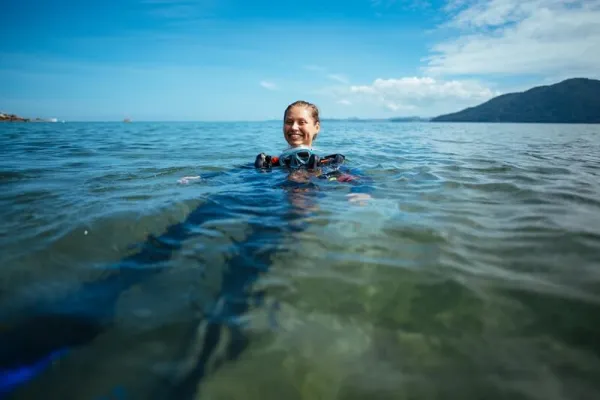
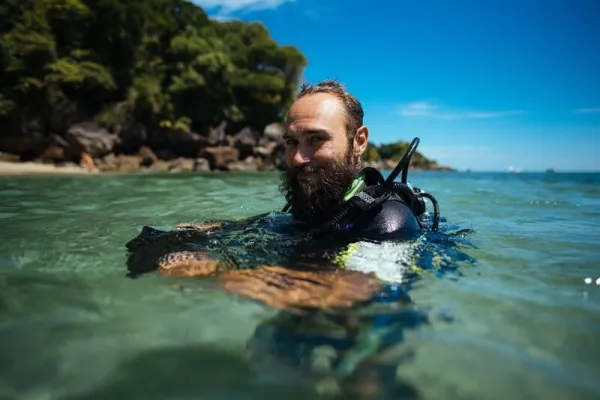
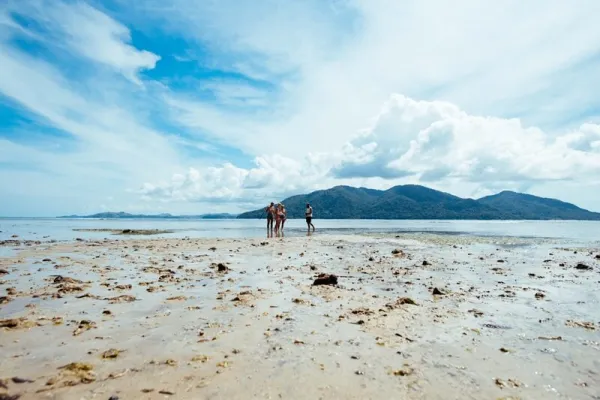


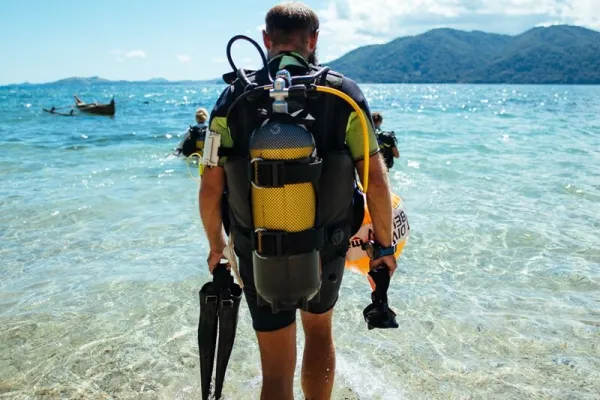

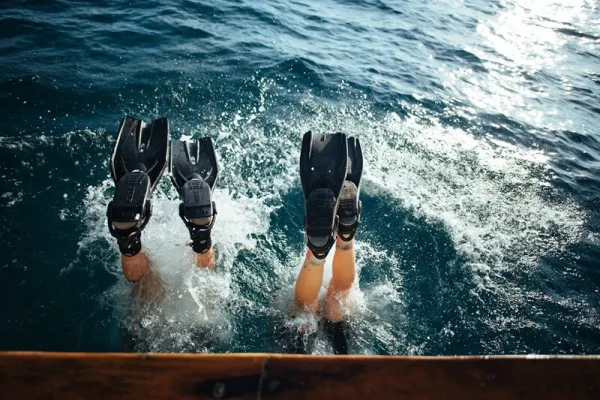
Living
Living
Airport Transfer
Volunteers should arrive at Nosy Be Fascene Airport for pick-up on Sunday before their start date. They will be met at the airport or boat port (if arriving overland) and transferred to the volunteer camp on Nosy Komba. The boat ride from Nosy Be to Nosy Komba takes about 45 minutes with the last boat of the day departing around 15:00. If volunteers do not arrive in time for the last boat to camp, our staff will assist in getting them to their hotel (we can provide hotel recommendations). The following day they will be met at a predetermined time and place and transferred to the camp. If there is time before the last boat departs for Nosy Komba, our staff will give them a tour of the town of Hellville where they can purchase snacks, a local SIM card, draw money at an ATM, etc. It is important to note that in addition to time constraints with boat departures and tides, shops and stores all close for siesta between noon and 14:30/15:00 each day.
For your departure: You are responsible to arrange and pay for your own transport back to the airport, however, we are happy to help you book your transport as needed.
Accommodation
We have 2 accommodation facilities in Madagascar. The first one, Turtle Cove, is built into the steep slopes of Nosy Komba, which is a multi-level compound overlooking the spectacular coral reef below. Climb stone stairs up from an idyllic beach to the main house situated above the dive deck and take in the stunning view of the ocean extending far across all the way to Lokobe Forest Reserve on Nosy Be. The main house accommodates senior staff members and serves as a meeting place and hangout for volunteers during the day. Large decks line the front of the main house complete with hammocks, bean bags, and benches.
Volunteers can expect to share a hut with four to six other volunteers and will need to bring their own bedding and towels. The huts have several bathroom facilities equipped with running water, flush toilets and cold water showers. There is also a work area for volunteers as well as lockable storage boxes available for each hut to store small valuables. Volunteers should also bring a padlock to secure personal items in their luggage when not in use.
The second camp is located on mainland Madagascar in the small remote village of Ampohana. Volunteers are accommodated in communal A-Frame bungalow fitted with double bunk beds. Our camps are eco-friendly with solar-powered lighting throughout. There are no charging facilities for electronic devices; volunteers are encouraged to bring a solar panel and battery pack to keep their devices charged. Charging ports are available in the neighboring village of Ampang, about a half-hour hike from camp.
We do have an onsite generator for staff use located at our main camp, though volunteers are welcome to charge small devices (no laptops) from this if there is space. Bear in mind that in an effort to go green, the use of the generator is minimal, sometimes only once per week or less.
Wi-Fi is not available on camp, however, there is Wi-Fi access in the neighboring village of Ampang, about a half-hour hike from camp. Volunteers can purchase a local sim card in Hellville along with 2GB of data for $5. Please ensure that your phone is unlocked and sim card compatible.
A hand-washing laundry station is provided on camp with a clean water tap, a concrete work surface for scrubbing, and buckets. Volunteers will need to purchase their own laundry soap (available in neighbouring Nosy Be) and can either do their own washing or pay one of the local kitchen or caretaker staff to do it for them.
It'll be great fun to live this life away from the network, where you'll get ample time to bond with your fellow mates, share your stories and plan out how to make a difference.
Meals
Three meals per day are provided seven days per week. Each meal is prepared by our on-site cooks using traditional Malagasy cooking methods using fresh, locally grown, seasonally available produce. Most meals have a rice base with beans and vegetables on the side (or over rice).
Fruits and vegetables served will change depending on the season and availability of local produce. Some meals will include fish/seafood, beef (zebu), or chicken. Meat, when part of a meal, is typically prepared with a sauce, cut into small pieces, and served over rice. In addition to bananas, breakfast usually consists of either baguettes and jam, eggs or crepes.
There is a vegetarian option for all meals. Due to logistics and the limitations of our remote location, we cannot provide a vegan option. Vegans can help themselves to the vegetable-based foods prepared, but will also need to supplement their diet with foods purchased off camp. If you have special dietary requirements, please let us know. We will do our best to provide accordingly, however you should not expect to eat as you normally do at home.
Know that you are volunteering in a remote region of a developing country and flexibility is necessary.
During your Free Time
A few popular weekend activities/places to visit are listed below.
- Lokobe Forest Reserve
- Discovery SCUBA Dive
- SCUBA Dive Training
- Explore different areas of Nosy Komba with a local guide and learn about medicinal plants, the endemic wildlife and more
- Tanikely Natural Reserve
- Visit Nosy Iranja or Nosy Sakatia (swimming and snorkeling)
- Whale Shark Watching (seasonal)
- Visit the Sacred Tree or Sacred Waterfall on Nosy Be
- Hike up Mount Passot on Nosy Be
- Visit Lemur Land park on Nosy Be, or the Lemur Park on Ampang Village on Nosy Komba
- Ankarana National Park
- Amber Mountain National Park
- Visit plantations on the mainland in the city of Ambanja
- Visit the city of Diego Suarez including the Emerald Sea, the Three Bays, Tsingy Rouge rock formation and more
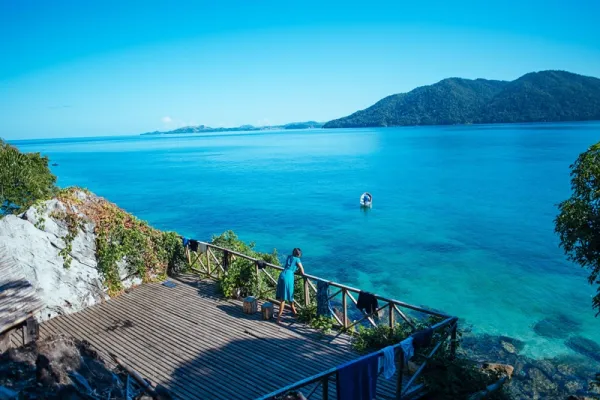
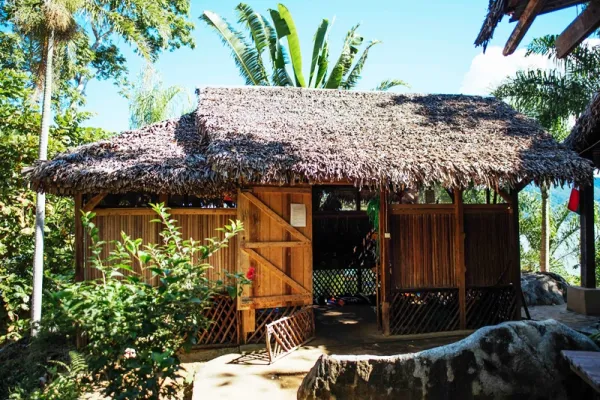
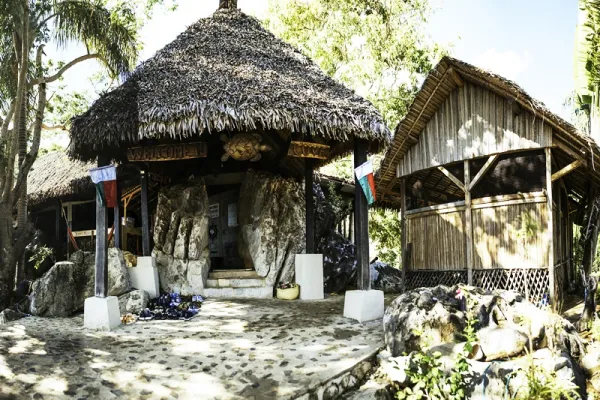
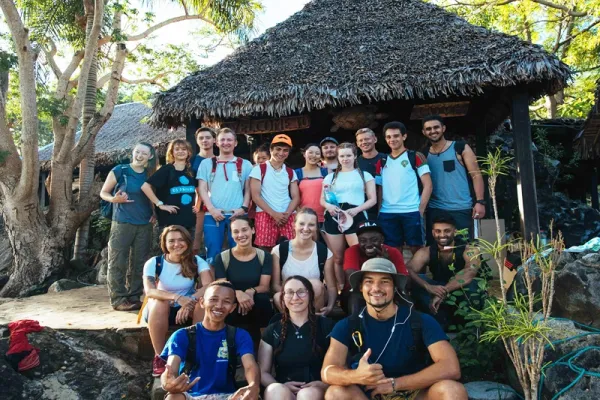

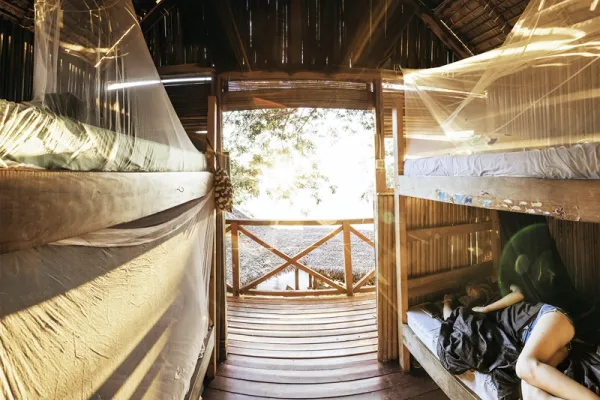
Dates
Dates
January
05
19
February
02
16
March
02
16
April
06
20
May
04
18
June
01
15
July
06
20
August
03
17
31
September
14
October
05
19
November
02
16
30
December
14
January
04
18
February
01
15
March
01
15
April
05
19
May
03
17
30
June
14
July
05
19
August
02
16
September
06
20
October
04
18
November
01
15
December
06
20
Available
Filling Fast
Booked Out
Costs
| Duration |
Program Fee
|
Choose your currency
|
|---|---|---|
| 4 Weeks | $2250 | |
| 5 Weeks | $2645 | |
| 6 Weeks | $3045 | |
| 7 Weeks | $3425 | |
| 8 Weeks | $3825 |
Please Note: An application fee of is charged over and above the program fee as an application payment. A 5% international banking fee is charged for credit card payments of program fee in USD/AUD.
Included
- 24 hrs Assistance and support from staff
- Comprehensive Pre- Departure Information
- Orientation
- Sleeping accommodation on camp for the program duration
- Three meals per day, seven days per week on camp
- Supervision and training by staff
- Airport pick-up in Nosy Be
- Transportation to program sites
- Supervision and training by a team of Rescue Divers, Dive Masters and Dive Instructors
- BCD's
- Tanks + Air Fills
- Regulators
- Weight Belts + Weights
- Scientific Survey Materials (i.e. quadrat, rulers, measuring tape, etc)
- Access to a speed boat
- Mandatory Ecological Monitoring Program Course
- Travel & Medical Insurance (Available at an extra cost)
Not Included
- Flights
- Visa costs
- Personal items
- Travel and health insurance
- Airport drop-off
- PADI crew packs / Manuals for the relevant diving courses (if applicable)
- PADI diving course fees (if applicable)
- Snorkel and mask (with tempered glass)
- Fins (open heel with booties are more comfortable for frequent use)
- Wetsuit (long or short, 3mm minimum)
- Surface marker buoy (DSMB)
- Reel (a small finger reel is adequate)
- Waterproof watch
- Dive compass
- Logbook
- Diving insurance
FAQ's
Application and Program Details
-
How long will it take to process my application? Will my application be accepted?
-
After you complete your application, your personalized ‘My Account’ will be active. You will need to upload your CV/Resume along with your photo in the same. Our backend team and the placement site takes around 10-12 days to review your application. After we review your CV and documents, your booking is confirmed and booking confirmation is updated in your ‘My Account’.
-
I haven’t traveled or volunteered abroad before. Can I still be a part of VolSol?
-
Yes, most definitely you can as we believe every participant brings something new to the project. If you do not have previous experience, we offer you the opportunity to have a great start with us. We make international volunteering easy – not only are our Volunteer Abroad opportunities rooted in offering you extensive support, but they are also very affordable.
-
Are there any necessary requirements to participate in the programs?
-
- You must be respectful towards the people living on the island
- You must be tolerant towards others and respect the differences
- You must welcome teamwork but also be able to work alone
- You must be at least 18 years old
- You have to be a proactive person, we welcome volunteers with initiative and creativity
- You must have at least an Intermediate level of English
-
Does VolSol provide a reference or a certificate after program completion?
-
Yes, we will provide you with the Certificate after successful completion of your program. The certificate is provided on request.
-
Can I volunteer as part of a group?
-
Yes, you are welcome to take part in the Programs in Madagascar as part of a group. We welcome families, friends, high school students, college/university and corporate groups to volunteer in Madagascar programs together.
-
How do I get to the program location?
-
The in-country coordinator will guide & assist you reach the program location, on the first day of the program.
-
When should I apply for the volunteer programs in Madagascar?
-
As we have limited spots available in our programs and we serve on a first come first basis, it is strongly recommended to apply for the program and reserve your spot in the program well in advance. You can book your spot in the program by filling an online form and pay the application fee.
Once you complete your application, your individual 'My Account' will be active in which you will receive your placement confirmation after which you can pay the program fees. You can pay the program fees later as well in installments, but 45 days before the program starts.
Connect with Past Volunteers
-
How can I connect with past Volunteering Solutions alumni as well as other former and current volunteers?
-
We encourage volunteers to get in touch with former Volunteering Solutions participants and also other program participants joining our projects. You are recommended to join the https://www.facebook.com/VolunteeringSolutions/"; target="_blank">Volunteering Solutions Facebook Page or https://www.facebook.com/groups/volunteeringsolutions/"; target="_blank">Facebook Group to communicate with other participants.
To read alumni interviews from past participants, visit the https://www.volunteeringsolutions.com/meet-a-volunteer"; target="_blank">Meet a Volunteer page on our website.
Flights and Visa
-
Can I know more about the flights and Visa?
-
Volunteers may fly directly into Nosy Be Fascene International Airport (airport code NOS), or into the capital city, Antananarivo (Tana for short; airport code TNR). If you fly into Tana, you can take a domestic flight from Tana to Nosy Be, or travel overland via Taxi Brousse or private car to Nosy Be. We can help arrange your overland transport if needed.
All visitors require visas and a one to two-month single entry visa may be obtained on arrival at the airport. This may be extended to in-country to a maximum of three months. We do recommend you check with the Consulate General as visa requirements can change at any time. A passport valid for 6 months after the date of return is required. Please ensure you have at least two blank pages available in your passport before the commencement of travel.
Health and Safety
-
Can I know more about the vaccinations required?
-
The https://wwwnc.cdc.gov/travel/destinations/traveler/none/madagascar"; target="_blank">CDC recommended the following vaccinations for travelers visiting Madagascar: hepatitis A, hepatitis B, typhoid, yellow fever, rabies, meningitis, polio, measles, mumps and rubella (MMR), Tdap (tetanus, diphtheria, and pertussis), chickenpox, shingles, pneumonia, and influenza.
-
Why should I volunteer in Madagascar?
-
Well, we believe you need no reason to be a part of something incredibly meaningful, such as volunteering in Madagascar. However, in case you are still wondering why you should be a part of this journey, here are a few reasons that would possibly convince you to join us.
It'll be a golden opportunity for you to take a closer look at nature and understand how the flora & fauna of this island has evolved over time, disconnecting from the rest of the world.
You'll get to work with professionals and gain some valuable surveying skills.
In case you join the Marine Conservation Program, you'll get a PADI certificate that'll benefit you in the days ahead as well.
You'll get to meet some amazing people from different parts of the world, and experience an amazing exchange of skills and thoughts.
If you are keen to learn and experience something new, then there can be nothing better than this!


























